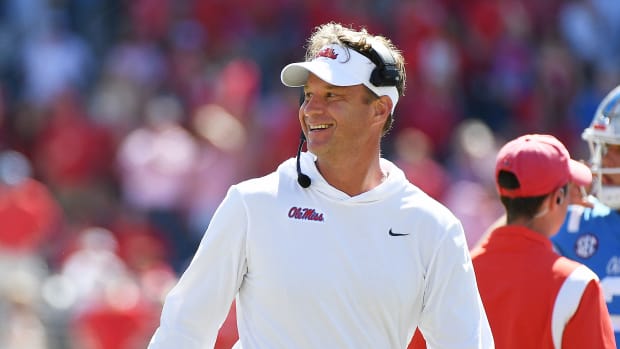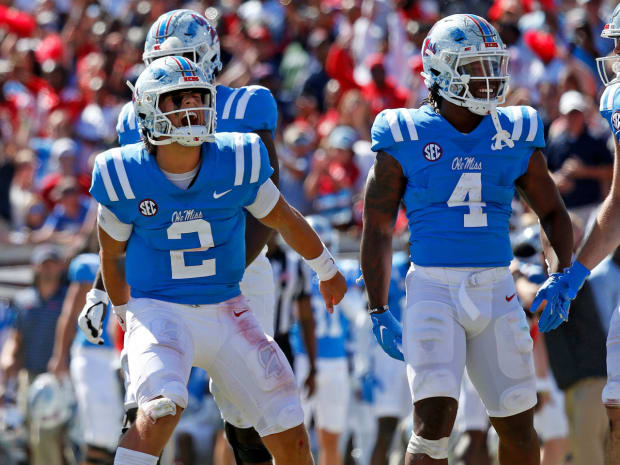OXFORD, Miss. — On Friday afternoon, less than 24 hours before Ole Miss kicked off against Kentucky in a duel of SEC unbeatens, the school’s most powerful boosters packed into a meeting room for a significant announcement about their approach to name, image and likeness (NIL).
Donors weren’t the only ones who gathered here. This standing room-only crowd included nearly every head coach of each sport on campus, as well as several athletic department administrators and two dozen athletes, all jammed into a room in an on-campus facility to celebrate the reorganization of its NIL collective.
Or, in other words, they announced their intention to, in a more organized fashion, pay players—something legalized last July and yet a jarring scene here Friday that speaks to the new era of college football.
For Ole Miss’s football coach, on hand for the announcement, it was a resounding victory that he’d furiously pursued for months—in subtle ways publicly and in aggressive ways privately.

Thomas Graning/AP
A day later, Lane Kiffin’s 14th-ranked Rebels beat No. 7 Kentucky, 22–19, for a ninth straight regular-season victory and a 12th in the last 13 tries.
Quite the weekend in Oxford, no? A new NIL collective and a top-10 win?
“It was good timing,” Kiffin said afterward.
Ole Miss, 5–0 for the first time since 2014, will be a heavy favorite in its next two games, at Vanderbilt and against Auburn. The Rebels are set up to be 7–0 before a trip to LSU on Oct. 22, a meeting of two programs built from the transfer portal (they signed more than 30 transfers this past cycle).
In fact, a transfer from Georgia Tech helped Kiffin’s team secure victory on Saturday. With Kentucky inside the 15-yard line in the final seconds and Ole Miss nursing its three-point lead, defensive end Jared Ivey swatted the ball from the hand of Kentucky quarterback Will Levis, forcing a fumble that was recovered by the Rebels.
It was the second straight possession in which Levis lost the ball under pressure, indicative of the game itself. The Wildcats (4–1) couldn’t consistently block the Rebels’ defensive front, putting their prized quarterback—projected by many to be an NFL first-round pick—in harm’s way.
Despite the pressure (three sacks and countless hurries), Levis put up solid numbers: 18-for-24 passing, 220 yards and two touchdowns. To show for it, he got a crooked finger, as well as other bumps and bruises and a pocket that seemed to be in a constant state of crumbling. The ‘Cats have now given up 19 sacks on the year.
And still, they could have won it in the end. Their lightning fast receiver, freshman Barion Brown (remember that name) had 164 yards on three kickoff returns—yes, three—and 81 yards receiving. For his final act, he put Kentucky in position to take the lead with a 51-yard catch-and-run to the Ole Miss 6-yard line with about one minute left. Levis, though, rushed the snap on first-and-goal. His own teammates weren’t set when he lofted a go-ahead touchdown pass to the end zone.
Flagged for illegal motion, the score was negated. Next came Ivey’s sack-and-fumble that had the sold-out crowd of more than 64,800 roaring on a crisp and sunny October day in north Mississippi.
Ole Miss fans came here to Vaught-Hemingway Stadium after a booze-filled brunch on The Grove. To Kiffin’s liking, they stayed and yelled and wagged their red pom-poms, stomping and screaming the Rebs to victory on the same week their coach publicly chided them for poor attendance. They appeared to listen.
“Keep doing it. We appreciate it,” Kiffin said after the game.
And they of course appreciate him. Everyone likes a winner. Kiffin is following a 10–3, Sugar Bowl season with what looks like quite the gem. He’s got a quarterback, USC transfer Jaxson Dart, with elusive ability and solid accuracy, a defense that seems to create big plays and a handful of skill guys who remind you of the groups Hugh Freeze assembled here in Oxford.
Perhaps even more important, Kiffin’s now got a collaborative NIL effort behind him. In this second year of the NIL era, the Rebels were behind some of their SEC rivals in the compensation category, the coach says.

Petre Thomas/USA TODAY Sports
It was somewhat of a messy situation. Donors were providing NIL while scattered over three-to-four different collectives, a disorganized and disparate attack to what is one of the most important aspects of recruiting these days.
Behind persistent encouragement from Kiffin, Ole Miss athletic director Keith Carter and former Rebels linebacker Walker Jones met with a bevy of power players over the last two months, helping convince the big-money boosters to roll their efforts into one: a reorganized and refurbished group called The Grove Collective, of which Jones will lead.
On Friday afternoon, Jones stood before more than 200 on hand to announce and celebrate the move. The Grove Collective’s goal is to provide NIL deals to more than 250 Ole Miss athletes. Collective officials believe they need to raise at least $7 million per year to be competitive in the ever-growing collective market. In May, Kiffin made national waves with comments to Sports Illustrated regarding an NIL recruiting space that has turned the college game into “a professional sport.”
On Friday, a happy Kiffin spoke after the collective’s announcement, emphasizing that Ole Miss had fallen “a long way behind” in the recruiting department without a cohesive NIL effort. “It’d be frustrating to have relationships with kids and their parents and [they’d say], ‘Well, we like you and what you’re doing, but we can’t turn down this money [from another school]’” Kiffin said.
With NIL, college administrators and coaches must walk a fine line. In most states, schools are not allowed to be involved with the facilitation of it. The only reason that university officials could be present at Friday’s news conference was because of a change to Mississippi’s law allowing communication between third parties and the school.
However, collectives are not supposed to use NIL endeavors in recruiting, and during his news conference Friday, Jones insisted that The Grove will not strike deals with athletes unless they are enrolled at the school.
And yet, NIL’s role in recruiting is much like a web, stretching across U.S. college sports. Whether they strike deals with recruits or not, collectives are supplying quasi-salaries to players on the current roster in an attempt to show prospects what awaits.
“You won’t sustain the success without that,” Kiffin said of the collective after the game. “It was awesome to see.”
And then, very quickly, Kiffin made the wise move. He turned the attention back to the game and its glorious atmosphere. “I haven’t thought near as much about [the collective] as the energy today—the stadium and the [Rebel] Walk,” he said.
Two of his transfer portal wins, Ivey and Dart, said it was the best atmosphere in which they’d ever played. Morning kickoff (11 a.m.) be damned, the fans showed up —many of them likely hungover from a wild Friday night in Oxford. The town’s main entertainment district, the Square, was so full that bars were limiting entry because of the fire code starting as early as 7 p.m. Lines stretched down streets, around corners and through alleys.
Meanwhile, on the field Saturday, it came down to a final defensive stand. The last two Kentucky series were so intense that Dart chewed his fingers on the sideline while watching his defense.
“I was going pretty hard on my nails,” he said, smiling.
While Dart nibbled, Ivey beat Kentucky right tackle David Wohlabaugh Jr. off the edge. He wheeled around the end, swung his mitt toward Levis and won the game.
“I reached out and the ball was right there,” Ivey said. “He basically put it in my hand.”







